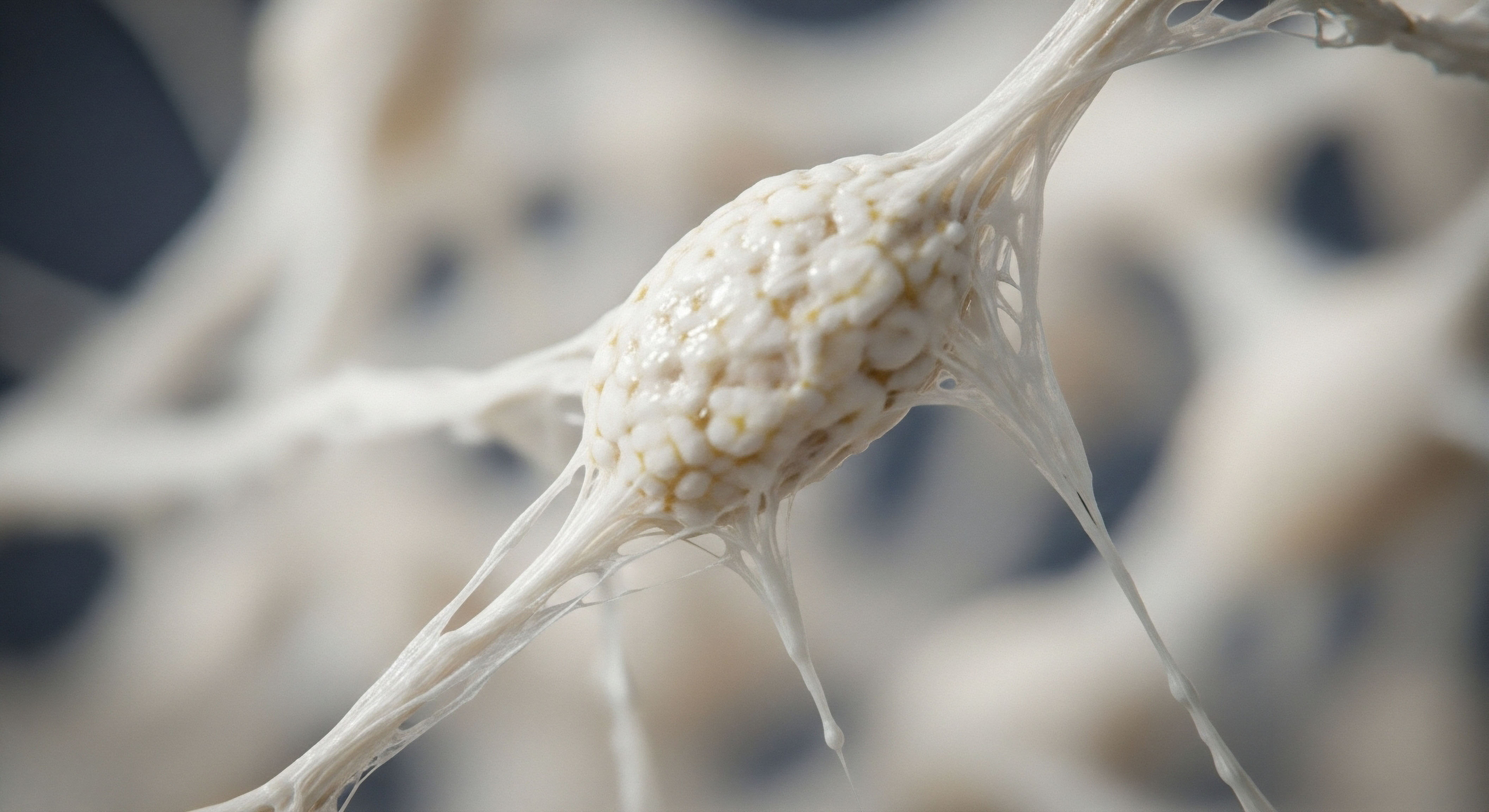

Fundamentals
Have you found yourself grappling with a persistent mental fog, a subtle yet unsettling decline in your sharpness, or a feeling that your cognitive gears are simply not turning as smoothly as they once did? Many individuals experience these shifts, often attributing them to the natural progression of time or the demands of a busy life.
This experience, however, frequently signals a deeper conversation occurring within your biological systems, particularly within the delicate orchestration of your hormones and metabolic processes. Your personal journey toward reclaiming vitality begins with recognizing these subtle signals, understanding that they are not isolated incidents but rather expressions of your body’s internal messaging.
The human body operates as an intricate network of communication, where chemical messengers, including hormones and peptides, direct nearly every cellular activity. When these messengers are out of balance, the effects can ripple throughout your entire system, impacting not only physical attributes but also the very clarity of your thought processes.
We often focus on the visible aspects of health, such as muscle mass or body composition, yet the unseen symphony of your endocrine system plays a similarly significant role in your mental acuity and overall well-being.
Cognitive shifts often reflect deeper imbalances within the body’s hormonal and metabolic communication networks.

Understanding Hormonal Influence on Brain Function
Hormones are powerful signaling molecules produced by endocrine glands, traveling through the bloodstream to target cells and tissues. They regulate a vast array of physiological processes, from growth and metabolism to mood and cognitive function. Consider, for instance, the role of testosterone.
While commonly associated with male characteristics, it is present in both sexes and plays a significant part in maintaining cognitive health, including memory, spatial abilities, and processing speed. Declining levels, whether due to age or other factors, can contribute to the very cognitive concerns many individuals voice.
Similarly, the balance of female hormones, such as estrogen and progesterone, profoundly influences brain health. Estrogen, for example, is known to have neuroprotective properties, supporting neuronal growth and connectivity. Fluctuations during perimenopause and post-menopause can lead to noticeable changes in memory, focus, and emotional regulation. Recognizing these connections helps us move beyond simply accepting cognitive decline as inevitable, instead viewing it as a potential signal for systemic recalibration.

The Endocrine System and Cognitive Vitality
The endocrine system, a collection of glands that produce and secrete hormones, acts as the body’s master control panel for numerous functions, including those governing the brain. The hypothalamic-pituitary-gonadal (HPG) axis, for example, is a complex feedback loop involving the hypothalamus, pituitary gland, and gonads (testes in men, ovaries in women).
This axis regulates the production of sex hormones, which in turn influence neurotransmitter systems and neuronal plasticity within the brain. A disruption in this axis can therefore have direct implications for cognitive performance.
Beyond sex hormones, other endocrine players, such as thyroid hormones and adrenal hormones like cortisol, also exert considerable influence over brain function. An underactive thyroid can lead to sluggishness and impaired concentration, while chronic stress and elevated cortisol levels can negatively impact memory and executive function. A comprehensive view of cognitive well-being must therefore consider the intricate interplay of these hormonal systems.

Peptides as Biological Messengers
Peptides are short chains of amino acids, smaller than proteins, that also act as signaling molecules within the body. They possess highly specific functions, interacting with receptors on cell surfaces to initiate a wide range of biological responses. While some peptides are naturally occurring hormones, others are synthetic compounds designed to mimic or modulate specific physiological pathways. Their precise actions make them compelling candidates for targeted therapeutic interventions.
The therapeutic application of peptides aims to restore or enhance specific biological functions that may have diminished due to aging, stress, or other physiological stressors. Unlike broader hormonal interventions, peptides often offer a more focused approach, targeting particular receptors or pathways to elicit desired effects. This specificity can be particularly advantageous when addressing complex, interconnected systems like those governing cognitive function.
Peptides are precise biological messengers that can target specific pathways to restore or enhance physiological functions.
Consider the concept of a biological “thermostat.” When the body’s internal temperature deviates from its set point, a series of signals are sent to restore balance. Similarly, when hormonal or metabolic systems drift from their optimal state, peptides can act as corrective signals, guiding the body back toward equilibrium. This recalibration is not about forcing a system into an unnatural state but rather supporting its innate capacity for self-regulation and optimal performance.


Intermediate
Moving beyond the foundational understanding of hormonal influence, we can now consider the specific clinical protocols that aim to support systemic balance and, by extension, cognitive vitality. Tailored peptide therapies, alongside hormonal optimization protocols, represent a precise approach to addressing the underlying biological mechanisms that contribute to cognitive concerns. These interventions are not one-size-fits-all solutions; rather, they are meticulously designed based on an individual’s unique physiological profile and symptomatic presentation.

Targeted Hormonal Optimization Protocols
Hormonal optimization, often referred to as hormone replacement therapy (HRT) or testosterone replacement therapy (TRT), involves the careful administration of bioidentical hormones to restore physiological levels. This approach is grounded in the understanding that optimal hormone concentrations are essential for robust cellular function, including that of neurons.

Testosterone Replacement Therapy for Men
For men experiencing symptoms of low testosterone, such as diminished mental clarity, reduced motivation, and fatigue, a structured testosterone replacement protocol can be transformative. A common approach involves weekly intramuscular injections of Testosterone Cypionate (typically 200mg/ml). This method provides a steady supply of the hormone, helping to normalize circulating levels.
To maintain the body’s natural testosterone production and preserve fertility, Gonadorelin is often included, administered via subcutaneous injections twice weekly. Gonadorelin stimulates the pituitary gland to release luteinizing hormone (LH) and follicle-stimulating hormone (FSH), which are crucial for testicular function.
Additionally, an oral tablet of Anastrozole, taken twice weekly, may be prescribed to manage the conversion of testosterone to estrogen, thereby mitigating potential side effects such as gynecomastia or fluid retention. In some cases, Enclomiphene may be incorporated to further support LH and FSH levels, particularly when fertility preservation is a primary concern.
The goal of these protocols extends beyond simply raising testosterone levels; it aims to restore a balanced endocrine environment that supports overall physiological function, including neurological health.

Testosterone Replacement Therapy for Women
Women, too, can experience the cognitive and physical impacts of suboptimal testosterone levels, particularly during pre-menopausal, peri-menopausal, and post-menopausal phases. Symptoms like irregular cycles, mood changes, hot flashes, and reduced libido often accompany these hormonal shifts.
Protocols for women typically involve lower doses of Testosterone Cypionate, often 10 ∞ 20 units (0.1 ∞ 0.2ml) weekly via subcutaneous injection. This precise dosing helps to achieve therapeutic levels without inducing unwanted androgenic effects. Progesterone is prescribed based on the woman’s menopausal status, playing a vital role in uterine health and also contributing to mood stability and sleep quality. For sustained release, pellet therapy, involving long-acting testosterone pellets inserted subcutaneously, can be an option, with Anastrozole considered when appropriate to manage estrogen levels.
These female-specific protocols recognize the unique hormonal landscape of women, aiming to restore equilibrium that supports both physical comfort and cognitive sharpness.

Growth Hormone Peptide Therapy and Cognition
Growth hormone (GH) plays a multifaceted role in the body, influencing metabolism, tissue repair, and even brain function. As individuals age, natural GH production declines, contributing to various age-related changes, including those affecting cognitive performance. Growth hormone-releasing peptides (GHRPs) and growth hormone-releasing hormone (GHRH) analogs stimulate the body’s own production of GH, offering a more physiological approach than direct GH administration.
Key peptides in this category include:
- Sermorelin ∞ A GHRH analog that stimulates the pituitary gland to release GH. It is often used for its anti-aging properties, muscle gain support, and improvements in sleep quality, which indirectly benefit cognitive function.
- Ipamorelin / CJC-1295 ∞ This combination provides a sustained release of GH. Ipamorelin is a GHRP that selectively stimulates GH release without significantly affecting cortisol or prolactin, while CJC-1295 is a GHRH analog that extends the half-life of GH release. Their combined action can support cellular repair, metabolic efficiency, and potentially neurogenesis.
- Tesamorelin ∞ Another GHRH analog, Tesamorelin has shown specific benefits in reducing visceral fat and improving cognitive function in certain populations, particularly those with HIV-associated lipodystrophy. Its impact on brain health is an area of ongoing study.
- Hexarelin ∞ A potent GHRP that also has cardioprotective effects. Its ability to stimulate GH release can contribute to overall cellular health and metabolic balance, which are foundational for cognitive performance.
- MK-677 ∞ An oral GH secretagogue that stimulates GH release by mimicking ghrelin. It offers a convenient way to elevate GH levels, supporting muscle mass, sleep, and potentially cognitive processes over time.
The benefits of these peptides extend beyond physical attributes, as improved sleep, reduced inflammation, and enhanced cellular repair create an optimal environment for brain health.
How Do Peptide Therapies Influence Neurotransmitter Systems?

Other Targeted Peptides for Systemic Support
Beyond growth hormone-releasing peptides, other specialized peptides address specific physiological needs that can indirectly or directly impact cognitive well-being.
PT-141 (Bremelanotide) is a peptide primarily known for its role in sexual health, acting on melanocortin receptors in the brain to influence sexual desire and arousal. While its direct cognitive benefits are not the primary indication, improved sexual function and satisfaction can contribute to overall psychological well-being, which in turn supports mental clarity and mood.
Pentadeca Arginate (PDA) is a peptide designed to support tissue repair, healing, and modulate inflammatory responses. Chronic inflammation is increasingly recognized as a contributor to cognitive decline and neurodegenerative processes. By helping to regulate inflammatory pathways and promote cellular regeneration, PDA can create a healthier internal environment that is conducive to optimal brain function. Its role in systemic healing underscores the interconnectedness of physical and mental health.
Personalized peptide and hormonal protocols aim to restore systemic balance, supporting both physical and cognitive well-being.
The application of these peptides requires careful consideration of individual health status, laboratory markers, and specific goals. A thorough clinical assessment ensures that the chosen protocols align with the body’s unique requirements, optimizing the potential for positive outcomes across various physiological domains, including cognitive function.
Here is a comparison of common peptide therapy goals and their potential cognitive implications:
| Peptide Category | Primary Physical Goals | Potential Cognitive Implications |
|---|---|---|
| Growth Hormone Secretagogues (e.g. Sermorelin, Ipamorelin) | Muscle gain, fat loss, improved sleep, tissue repair | Enhanced sleep quality, improved cellular repair in brain, potential for better memory and focus due to systemic health improvements |
| Sexual Health Peptides (e.g. PT-141) | Increased libido, improved sexual function | Improved mood, reduced stress, enhanced psychological well-being, indirectly supporting cognitive clarity |
| Healing & Anti-inflammatory Peptides (e.g. PDA) | Tissue repair, inflammation modulation, accelerated recovery | Reduction of neuroinflammation, support for neuronal health, potentially mitigating cognitive decline associated with chronic inflammation |


Academic
To truly appreciate how tailored peptide therapies can support cognitive function, we must delve into the sophisticated interplay of endocrinology, neurobiology, and metabolic pathways at a deeper, more mechanistic level. The brain, often considered the body’s command center, is profoundly sensitive to its internal milieu, with hormonal fluctuations and metabolic dysregulation having direct and indirect consequences on neuronal health and synaptic plasticity. Our exploration here focuses on the intricate biological axes and cellular mechanisms that underpin cognitive vitality.

The Neuroendocrine Axes and Cognitive Resilience
Cognitive function is not an isolated brain phenomenon; it is inextricably linked to the broader neuroendocrine system. The hypothalamic-pituitary-adrenal (HPA) axis, often associated with stress response, also plays a significant role in cognitive processes. Chronic activation of the HPA axis, leading to sustained elevated cortisol levels, can induce neurotoxicity, particularly in the hippocampus, a brain region critical for memory formation.
Research indicates that prolonged exposure to high cortisol can reduce hippocampal volume and impair synaptic plasticity, directly affecting learning and memory.
Similarly, the hypothalamic-pituitary-thyroid (HPT) axis governs thyroid hormone production, which is essential for brain development and adult cognitive function. Thyroid hormones influence neuronal differentiation, myelination, and neurotransmitter synthesis. Subclinical hypothyroidism, characterized by slightly elevated thyroid-stimulating hormone (TSH) and normal thyroid hormone levels, has been associated with impaired executive function, attention deficits, and memory complaints. Optimizing thyroid function, often overlooked in cognitive assessments, can therefore have a substantial impact on mental acuity.
Can Peptide Therapies Directly Influence Neurogenesis and Synaptic Plasticity?

Growth Hormone and Insulin-Like Growth Factor 1 in Neuroprotection
The role of growth hormone (GH) extends far beyond its anabolic effects on muscle and bone. GH and its primary mediator, Insulin-like Growth Factor 1 (IGF-1), are critical for central nervous system (CNS) health. IGF-1 receptors are widely distributed throughout the brain, particularly in regions involved in learning and memory, such as the hippocampus and cerebral cortex. IGF-1 promotes neurogenesis (the birth of new neurons), synaptogenesis (the formation of new synapses), and neuronal survival.
Age-related decline in GH and IGF-1 levels is a well-documented phenomenon, correlating with a decrease in cognitive performance. Tailored peptide therapies, such as those utilizing Sermorelin or Ipamorelin/CJC-1295, stimulate the pulsatile release of endogenous GH, thereby increasing systemic and potentially brain IGF-1 levels.
This physiological elevation of IGF-1 can counteract age-related neurodegeneration, support neuronal repair mechanisms, and enhance cognitive resilience. Studies have shown that restoring IGF-1 levels can improve spatial memory and learning in animal models of aging.
The mechanism involves IGF-1’s ability to activate intracellular signaling pathways, including the PI3K/Akt pathway, which are crucial for cell survival, proliferation, and synaptic function. By promoting these fundamental cellular processes, GH-releasing peptides offer a sophisticated means to support the brain’s structural and functional integrity.

Peptides and Neurotransmitter Modulation
Beyond their influence on growth factors, certain peptides can directly modulate neurotransmitter systems, which are the chemical messengers of the brain. Neurotransmitters like dopamine, serotonin, acetylcholine, and GABA are fundamental for mood, attention, memory, and executive function.
For instance, PT-141 (Bremelanotide), while primarily known for sexual function, acts as a melanocortin receptor agonist. Melanocortin receptors are present in various brain regions, including those involved in reward, motivation, and cognitive processing. While direct cognitive enhancement is not its primary indication, the modulation of these pathways can indirectly influence alertness and focus. The broader implication is that peptides can interact with complex neural circuits, offering avenues for subtle yet significant neurochemical adjustments.
Another area of academic interest involves peptides that influence inflammation and oxidative stress within the brain. Chronic low-grade neuroinflammation is a recognized contributor to cognitive decline and neurodegenerative conditions. Peptides like Pentadeca Arginate (PDA), with its reported anti-inflammatory and tissue-repairing properties, could theoretically mitigate neuroinflammatory processes.
By reducing the burden of inflammatory cytokines and reactive oxygen species, PDA might protect neuronal integrity and support optimal synaptic function. This protective effect on the microenvironment of the brain is a critical aspect of long-term cognitive health.
Peptides influence cognitive function by modulating neuroendocrine axes, promoting neurogenesis, and regulating neurotransmitter systems.
The following table summarizes the mechanistic actions of selected peptides on cognitive pathways:
| Peptide | Primary Mechanism of Action | Direct Cognitive Relevance | Supporting Research |
|---|---|---|---|
| Sermorelin / Ipamorelin / CJC-1295 | Stimulates endogenous GH release, increasing IGF-1 levels | Promotes neurogenesis, synaptogenesis, neuronal survival; improves memory and learning | Studies on age-related cognitive decline and IGF-1’s role in brain plasticity |
| Tesamorelin | GHRH analog, reduces visceral fat, influences brain metabolism | Improved verbal learning and memory in specific populations (e.g. HIV-associated cognitive impairment) | Clinical trials demonstrating cognitive benefits in specific patient groups |
| PT-141 | Melanocortin receptor agonist in CNS | Indirect influence on motivation and alertness via neural reward pathways | Research on melanocortin system’s role in behavior and cognition |
| Pentadeca Arginate (PDA) | Anti-inflammatory, tissue repair, antioxidant properties | Mitigates neuroinflammation, protects neuronal integrity, supports brain microenvironment | Studies on inflammation’s role in neurodegeneration and potential therapeutic targets |

The Future of Personalized Neuro-Peptide Protocols
The academic pursuit of understanding peptide therapeutics for cognitive enhancement is rapidly evolving. Current research is exploring the precise targeting of specific neuronal pathways and the development of peptides that can cross the blood-brain barrier more efficiently. The complexity lies in the brain’s intricate network and the subtle balance required to optimize function without unintended consequences.
Personalized neuro-peptide protocols represent a sophisticated frontier in wellness. They demand a deep understanding of an individual’s unique neuroendocrine profile, genetic predispositions, and lifestyle factors. The integration of advanced laboratory diagnostics, including comprehensive hormone panels, neurotransmitter assessments, and inflammatory markers, is paramount. This data-driven approach allows for the selection of specific peptides and dosages that are most likely to yield beneficial cognitive outcomes, moving beyond a symptomatic approach to address root physiological imbalances.
What Are the Long-Term Safety Considerations for Cognitive Peptide Therapies?
The promise of tailored peptide therapies for cognitive function lies in their ability to act as precise biological signals, guiding the body’s innate systems toward optimal performance. This scientific endeavor, when approached with rigor and a deep respect for individual physiology, offers a compelling path toward reclaiming mental sharpness and overall vitality.

References
- Sapolsky, Robert M. “Stress and the brain ∞ Emerging concepts in neuroendocrinology.” Dialogues in Clinical Neuroscience 7.2 (2005) ∞ 115-133.
- Hage, Michel P. and Anthony P. Azar. “The link between thyroid function and cognition.” Journal of Thyroid Research 2012 (2012) ∞ 317659.
- Aleman, Andre, and Dick J. Veltman. “Neuroimaging of the effects of growth hormone and insulin-like growth factor-I on brain structure and function.” Psychoneuroendocrinology 31.9 (2006) ∞ 1011-1021.
- Sonntag, William E. et al. “The role of the GH/IGF-1 axis in brain aging.” Molecular and Cellular Endocrinology 284.1-2 (2008) ∞ 1-12.
- Koutkia, Paraskevi, et al. “Tesamorelin, a growth hormone-releasing factor analogue, improves body composition and maintains bone turnover in HIV-infected patients with lipodystrophy.” Journal of Clinical Endocrinology & Metabolism 91.11 (2006) ∞ 4409-4415.
- Cone, Roger D. “Targeting the melanocortin system for drug discovery.” Trends in Pharmacological Sciences 29.12 (2008) ∞ 617-622.
- Glass, Christopher K. and Li-Huei Tsai. “Molecular mechanisms of neurodegeneration and neuroinflammation.” Cell 180.5 (2020) ∞ 802-825.

Reflection
As you consider the intricate connections between your hormonal health, metabolic function, and cognitive vitality, reflect on your own unique biological narrative. The insights shared here are not merely academic points; they are invitations to a deeper understanding of your own body’s signals.
Recognizing that symptoms like mental fogginess or reduced focus can be expressions of underlying systemic imbalances opens a path toward proactive self-reclamation. Your personal journey toward optimal function is precisely that ∞ personal. It requires a thoughtful, evidence-based approach, guided by a clinician who respects your lived experience and can translate complex biological data into a clear, actionable plan.
This knowledge is a powerful first step, enabling you to engage with your health journey from a position of informed empowerment.



